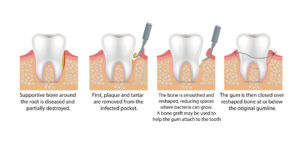
Dental Flap Surgery
What is it dental flap surgery?
A specialist operation called dental flap surgery is used to treat periodontal disease. When gum disease has advanced to the point that deep pockets have formed between the gums and teeth, surgery is usually necessary. Bacteria may be present in these spaces, which could cause more bone and tissue loss. Direct access to these pockets by dental flap surgery facilitates complete cleaning and, if required, the excision of diseased tissue.



Dental Flap Surgery Treatment
In order to restore gum health and stop additional damage, there are various steps involved in the dental flap surgery therapy process. Your dentist will perform a comprehensive examination prior to the operation, which may involve X-rays to determine the severity of the gum disease and the state of the bone. This aids in surgical planning and guarantees that all afflicted regions receive treatment.
The dentist will clean the root surfaces to get rid of tartar and plaque during the procedure. If there has been a substantial loss of bone, bone grafting can be required in some circumstances. Bone grafts maintain and repair the bone around the teeth. The gum flap is sutured back into place and the area is given time to heal once any necessary grafting has been completed and cleaned.
Procedure for Dental Flap Surgery
Dental flap surgery is a simple procedure that, depending on the severity of the disease, usually takes one to two hours. Here’s a detailed rundown of what to anticipate:
Anesthesia: To make the surgery site numb, local anesthetic is used.
Small incisions made by the dentist in the gums form a flap that can be pulled to reveal the tooth roots and bone.
Cleaning: The sick tissue, plaque, and tartar are eliminated from the bone and roots.
Bone Grafting (if necessary): Grafting material can be inserted to promote bone regeneration in cases of bone loss.
Suturing: After realigning, the gum flap is sewn back into position.
After surgery, the patient will receive instructions from the dentist along with prescriptions for painkillers or antibiotics if needed.
Before and After Dental Flap Surgery Procedure:
To get a good result, it is essential to comprehend the dental flap surgery before and after procedures. You should adhere to all of your dentist’s instructions prior to the procedure. This can entail staying away from specific drugs, having a small lunch, and making travel arrangements if sedation is required.
Prior to the procedure:
During the consultation, your dentist will go over the advantages, risks, and procedure. X-rays could be performed to evaluate the situation.
Prior to surgery Guidelines: Observe any dietary or pharmaceutical recommendations made by your dentist.
Planning for Anesthesia: Talk to your dentist about any worries you have regarding anesthesia.
Following the procedure:
For immediate relief, apply cold packs to the affected area and take the recommended painkillers.
Oral Hygiene: Use a suggested mouthwash and brush your teeth gently to maintain appropriate oral hygiene.
Diet: To prevent aggravating the surgery site, limit your intake to soft meals during the first few days.
Follow-Up Visits: Show up for all planned follow-ups to track healing and, if required, have sutures removed.
Following Dental Flap Surgery
Following dental flap surgery, appropriate care is necessary to promote healing and avoid problems. You should strictly adhere to your dentist’s advice during the one to two week recuperation period.
Pain management: Prescription drugs or over-the-counter painkillers can be used to treat discomfort.
Control of Swelling: Following surgery, swelling is typical. Swelling in the face can be decreased by applying ice packs.
Maintain Good Oral Hygiene: Avoid irritating the surgery region when brushing and flossing. Using the recommended mouthwash can assist maintain cleanliness.
Diet: For the first few days, soft foods are advised. Steer clear of anything tough, crunchy, or hot that can irritate your gums.
Aftercare: To ensure appropriate healing and to address any issues, show up for all follow-up sessions.
After surgery, it’s critical to abstain from alcohol and smoking as they can obstruct healing. Call your dentist right away if you have any strange symptoms, such as severe pain or heavy bleeding.


Conclusion for dental flap surgery
Dental flap surgery is a very effective treatment for advanced periodontal disease and severe gum disease. If you have been diagnosed with periodontal disease and non-surgical treatments have not been successful, your dentist may recommend dental flap surgery as a next step. Treating the underlying cause of your gum disease with this procedure can significantly improve your dental health and prevent more issues in the road. Consult your dentist to determine whether dental flap surgery is the right course of action for you by discussing the potential benefits and drawbacks.
F.A.Q.
Srikanth Dental
A local anesthetic is used during the actual surgery, so you shouldn’t experience any pain. After the anesthesia wears off, there can be some mild discomfort, but this can be treated with painkillers.
The amount of time it takes for recovery varies from person to person, however most people recover in one to two weeks. For a speedy recovery, it’s imperative that you adhere to your dentist’s post-operative care guidelines.
Dental flap surgery has certain dangers, such as bleeding, edema, and infection, just like any other surgical operation. But when a skilled dentist performs the procedure and appropriate aftercare is given, these risks are reduced.
Your dentist will give you detailed information on how to take care of yourself after surgery. This can entail using a particular mouthwash, abstaining from particular meals, and going to follow-up checkups to track the healing process.
